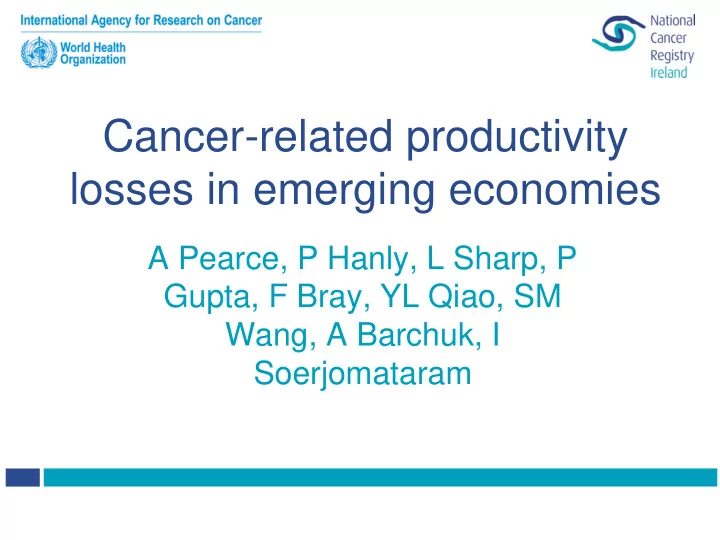

Cancer-related productivity losses in emerging economies A Pearce, P Hanly, L Sharp, P Gupta, F Bray, YL Qiao, SM Wang, A Barchuk, I Soerjomataram
Cancer in emerging economies Cancer deaths Cancer diagnoses Developed Developed countries Developing countries 36% Developing countries 46% countries 54% 64%
BRICS countries World's population World's land area World's GDP Developing Developing Developing countries countries countries 25% 25% Developed 40% Developed Developed countries countries countries 60% 75% 75%
Burden of cancer Everyone’s work contributes to the economy, and not working represents a loss to society
Aim To estimate the value of lost productivity due to cancer-related premature mortality in Brazil, Russia, India, China and South Africa (BRICS)
Methods & Data • Incidence-based, human capital approach • GLOBOCAN data Cancer mortality rates • OECD & ILO data Workforce participation & unemployment Wages & future wage growth Retirement ages
Deaths & YPLL Deaths & Years of Productive Life Lost 600 Deaths (1,000s) 500 YPLL (10,000s) 400 300 200 100 0 Male Female Male Female Male Female Male Female Male Female Brazil China India Russia Sth Africa
Total cost & cost per death Total cost and cost per death $25 $100,000 Billions $20 $80,000 $15 $60,000 $10 $40,000 $5 $20,000 $0 $0 Male Female Male Female Male Female Male Female Male Female Brazil China India Russia Sth Africa Total Cost Cost per death
Results by cancer 11 important cancers Leukaemia Brain & NS Prostate Cervix Breast Melanoma Lung Liver Colorectum Stomach Oesophagus
Tobacco related cancers Russia Brazil India Lung Non- Lip, oral cavity tobacco related Nasopharynx cancers Other pharynx China Sth Africa Oesophagus Larynx
Sensitivity Analyses • Divide Chinese data by urban and rural • Increase retirement ages in China & Russia • Changing growth rates & discounting • Increase workforce participation in India Increased female participation Base case Females, Females 29% 36% Males Males, 64% 71%
Implications • Prevention activities are important, and need to extend beyond tobacco control • Earlier detection and improved treatment availability to reduce mortality may be economically efficient • Potential increase in cancer burden through ageing, urbanisation and westernisation
Conclusions • Limitations: lack of data, assumptions around employment (informal economies and household production) • Valuing cancer related lost productivity can provide policy makers with an additional perspective when identifying priorities for cancer prevention and control
Acknowledgements • COST Action IS1211 CANWON which funded Alison Pearce to undertake a Short Term Scientific Mission to IARC, supervised by I. Soerjomataram, to establish this project • Alison Pearce is funded by an HRB ICE Award
Recommend
More recommend